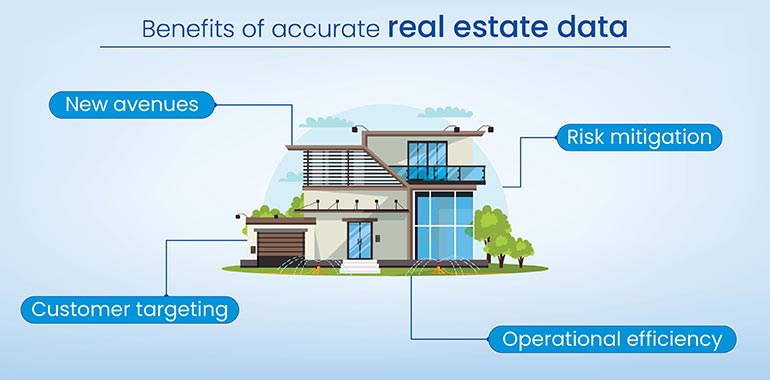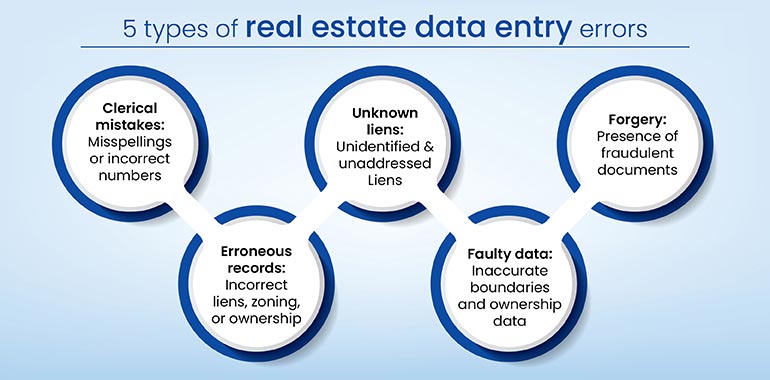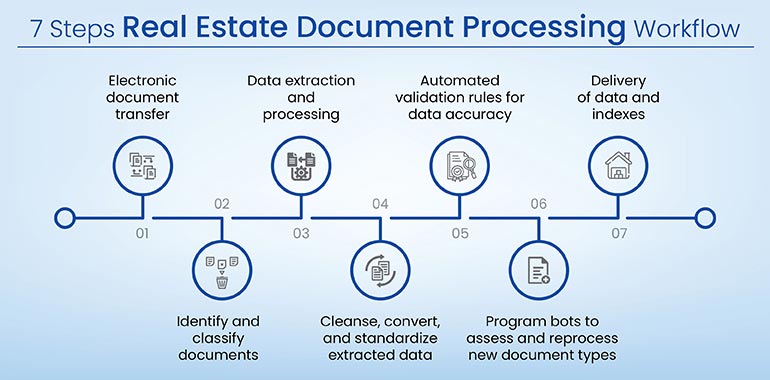5 Powerful Ways Image Annotation Improves Computer Vision
Data is the new gold particularly in real estate industry. As data aggregators, you can efficiently process voluminous property information only if you have a robust and agile strategy.
Real estate decisions were traditionally made solely based on gut feelings or conventional methods. The industry has seen a seismic shift in how data is used, moving from simple spreadsheets to complex algorithms that can predict market trends. The evolution has been rapid and transformative, impacting every facet of the industry – from property valuation to customer engagement.
Table of Contents
For data aggregators, this evolution is not just a trend, but a necessity. Accurate and timely real estate data is the backbone of your business, enabling you to provide valuable insights to your users.
In a saturated market, having a competitive edge is not just beneficial; it’s essential.
Effective data processing strategies offer this edge. By optimizing how you handle real estate data, you can provide more accurate, timely, and comprehensive information on your portal. This not only attracts more users, but also makes your platform the go-to source for real estate data aggregation. Moreover, efficient real estate data processing services can significantly reduce operational costs. The strategic processing of real estate data is not just an operational necessity but a strategic asset that can significantly impact your market standing.

Let’s start by diving into the challenges of real estate data processing and how effective strategies can help you handle those effectively.
Navigating the complex world of real estate data processing is no small feat. While the industry has come a long way in leveraging data for various operational and strategic purposes, it’s not without its challenges.
One of the most pressing issues is the prevalence of inaccuracies in real estate property documents. These inaccuracies can stem from various sources, each with its own set of complications. These can have a ripple effect, causing a chain of errors that can compromise the integrity of entire datasets. Here are some types:

Given these challenges, the need for robust, technology-focused solutions is evident. Advanced document management systems can automate document processing workflow, significantly reducing the likelihood of errors. Machine learning algorithms can sift through vast amounts of data to identify inconsistencies or inaccuracies, flagging them for review. Blockchain technology can provide a secure and transparent record of transactions, making forgery nearly impossible.
One of the lingering challenges in real estate data processing is the lack of standard formats for routine reporting and dynamic modeling. This makes it difficult to compare data across different platforms or to integrate new datasets into existing systems. Standardization of datasets and reporting formats can go a long way in making data more accessible and usable.
With the right technology and strategies, these challenges can be overcome, paving the way for more efficient, accurate, and profitable operations. For real estate data aggregators, investing in such solutions is not just a good business practice; it’s a necessity for long-term success.
A good data strategy is characterized by its alignment with organizational goals, its focus on key metrics, and its adaptability to changing market conditions. Importantly, this strategy must be communicated across all levels of the organization to ensure cohesive execution.
A well-crafted data strategy serves as the backbone of any successful real estate data processing initiative. It’s not just about collecting data but making it actionable and aligned with the broader organizational goals. Here are some key characteristics that define a good data strategy:
A well-structured workflow is the backbone of any successful real estate data processing strategies. Let’s dissect each step of this 7-step workflow to understand its intricacies, benefits, and real-world applications.

Example: A real estate firm scans all incoming paper documents and uses OCR to convert them into digital formats, which are then securely transferred to a centralized server.
Example: An automated system sorts incoming documents and tags them appropriately, so a deed is automatically stored in the “Deeds” folder with metadata such as property ID and transaction date.
Example: A machine learning model scans through contracts to extract and verify key terms, such as sale price and closing date, against external databases.
Example: Extracted dates in various formats are standardized to a single format like YYYY-MM-DD, and any duplicate property listings are removed.
Example: If a newly extracted property value significantly deviates from historical data, an automated alert is triggered for manual verification.
Example: When a new type of financial statement is introduced in the industry, the bot is programmed to recognize and accurately process it.
Example: Once all data is processed and validated, it is converted into a client-specified XML format and securely transmitted back to the client’s server.
By meticulously following this 7-step workflow, real estate data aggregators can significantly enhance the efficiency, accuracy, and reliability of their data processing operations.
Do you want to nail your document processing workflow?
Real estate data processing strategies offer numerous benefits. They enable accurate property valuations, identification of market trends, and improved decision-making. They also enhance customer experiences, optimize pricing, and provide a competitive edge. Furthermore, they help mitigate risks and streamline internal processes. Here are some of them:
The ability to identify trends is one of the most potent competitive advantages a firm can have.
Example: By analyzing search queries and user interactions on their platform, a real estate data aggregator identifies a growing interest in properties with home offices. They then focus on collecting and showcasing such properties and gaining a competitive edge.
The real estate industry deals with enormous volumes of data. The ability to organize this data quickly is crucial for efficiency.
Example: A real estate firm uses a data warehouse to store all transactional data. Automated tools sort this data by various parameters, such as location, transaction type, and price range, making it easier to derive insights.
Time is of the essence in the real estate industry. The quicker you can collect and analyze data, the faster you can act on it.
Strategic use of data can guide capital allocation, ensuring that investments are made in properties with high growth potential.
Example: By analysing historical data and market trends, a firm identifies a particular type of commercial property that has consistently provided high returns. They then allocate a significant portion of their investment capital to such properties.
A robust data strategy is not just an operational tool; it’s a competitive weapon. By leveraging analytics, identifying trends, and making strategic use of data, real estate data aggregators can gain a significant edge in the market. Efficiency is not just about doing things faster; it’s about doing the right things that drive growth and profitability.
Emerging technologies like Artificial Intelligence (AI), Machine Learning (ML), and advanced analytics have revolutionized real estate data processing. These technologies can sift through thousands of real estate documents in a fraction of the time it would take a human with far greater accuracy. They can categorize documents, manage workflows, and even predict future property values based on historical data.
For instance, a sophisticated document management system can automate the entire document processing workflow, from document categorization to data extraction and validation. This is particularly crucial for real estate data aggregators, who deal with a plethora of property data processing tasks daily.
How Hitech BPO helps companies to develop and implement real estate data processing strategy
Hitech BPO has carved a niche for itself as a leader in real estate document processing. They offer a holistic approach to data strategy, ensuring that companies can navigate the complexities of real estate data effectively.
Hitech BPO has established itself as a frontrunner in crafting and executing comprehensive real estate document processing strategies. Their services are not limited to data entry; they offer a full spectrum of solutions that address the multifaceted challenges of real estate data management.
Comprehensive Data Entry Services
Cutting-edge Technology
Quality and Efficiency
By offering these specialized services, Hitech BPO ensures that companies can not only develop but also effectively implement a robust, efficient, and scalable real estate data processing strategy.
By focusing on these key aspects, Hitech BPO ensures that companies can develop and implement a robust, effective, and scalable real estate data processing strategy.
Data is no longer a byproduct but a vital asset in the real estate industry, driving revenue and shaping modern practices. It informs investment decisions through predictive analytics and automates processes via machine learning. Effective data strategies align with organizational goals, focus on key metrics, adapt to market changes, and leverage advanced technologies to ensure quality and efficiency.
The industry is progressively positioning itself for a future where data’s role is even more critical. From small firms to large enterprises, significant strides are being made in data strategy. The future of real estate lies not just in physical properties but in data, making a robust data strategy a necessity for success.
What’s next? Message us a brief description of your project.
Our experts will review and get back to you within one business day with free consultation for successful implementation.
Disclaimer:
HitechDigital Solutions LLP and Hitech BPO will never ask for money or commission to offer jobs or projects. In the event you are contacted by any person with job offer in our companies, please reach out to us at info@hitechbpo.com
Leave a Reply